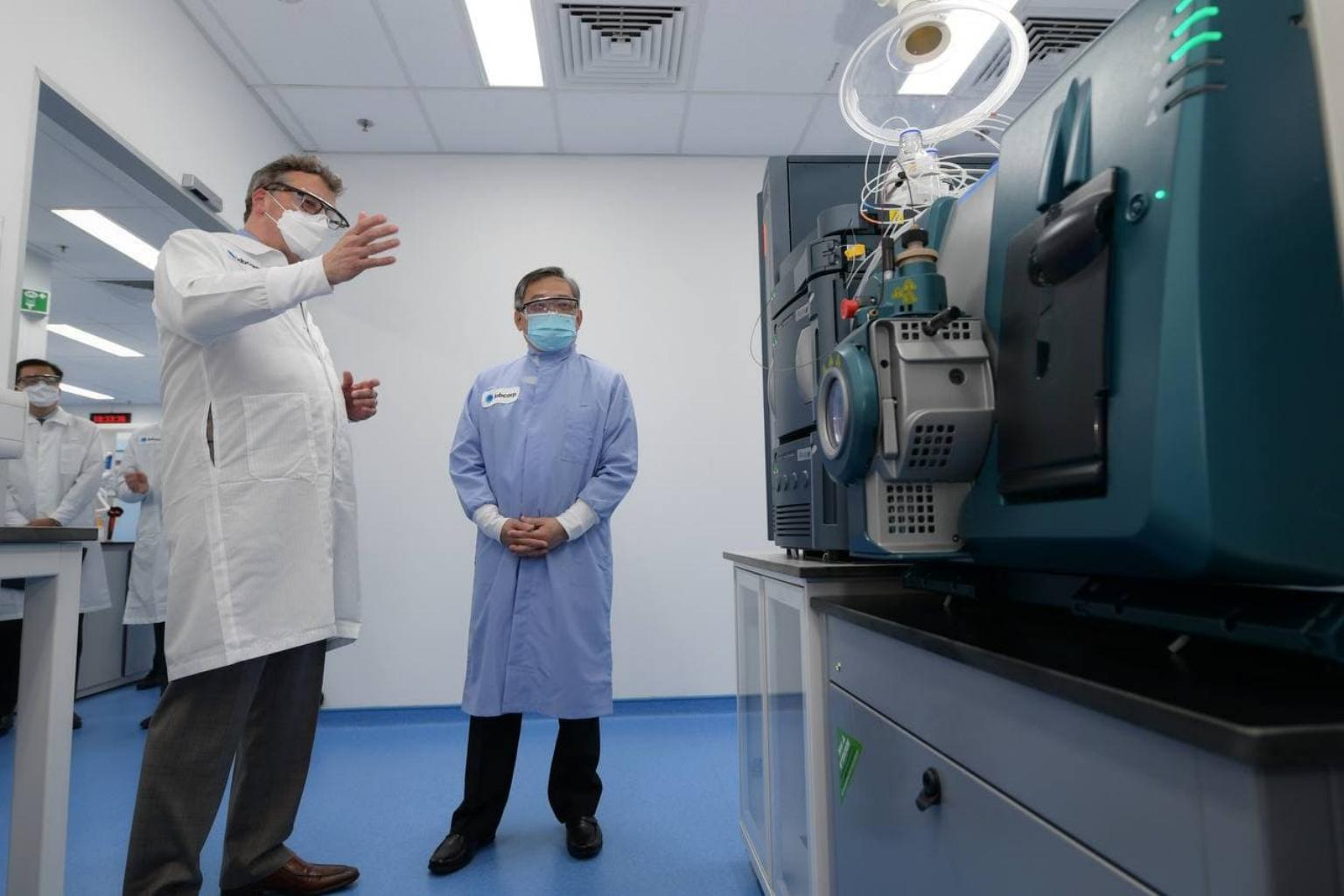90 jobs to be added with expansion of Labcorp facility in S'pore, as biomedical sector continues to grow
Sign up now: Get ST's newsletters delivered to your inbox
Follow topic:
SINGAPORE - Around 90 additional research and engineering jobs will be created in the biomedical sector with the setting up of a new bioanalytical laboratory facility by leading contract research organisation Labcorp, and the expansion of its existing central laboratory here.
The combined facility in Jurong East, which is the first of its kind in South-east Asia, "will add cutting-edge capabilities to our thriving biomedical ecosystem" and "make us an even more compelling regional biomedical hub, help us attract more leading-edge investments in the sector", said Trade and Industry Minister Gan Kim Yong on Wednesday (Nov 10) at the facility's launch.
"In particular, Labcorp's new Good Laboratory Practice and Good Clinical Practice-compliant bioanalysis and immunochemistry platforms will provide bioanalytical testing services that are critical to early-stage development of biologics and vaccines in Singapore," noted Mr Gan.
He said that job opportunities that come with the expansion include those in the healthcare sector, such as nursing coordinators to facilitate decentralised clinical trials, as well as data engineers to develop artificial intelligence technologies to assist in diagnosing diseases.
The expansion of Labcorp's laboratory will also provide companion diagnostics laboratory testing support, as well as cell and gene therapy testing capabilities.
Companies here will also be able to tap Labcorp's services to speed up the design, development and commercialisation of healthcare technologies, he added.
For instance, smaller firms can use Labcorp's expertise to conduct clinical trials and navigate regulatory requirements. This can include laboratory assessments and compiling lab test reports, as well as contracting courier services for delivering lab kits.
The expansion - which comes 25 years after Labcorp established its regional headquarters here in 1996 - will add on to the company's 350-strong team.
"The addition of the bioanalytical laboratory will help us to meet the increased pharmaceutical and biotechnology demand in Asia-Pacific, and shows our commitment to expanding our operation in Singapore," said Dr Paul Kirchgraber, chief executive of Labcorp Drug Development.
The increased laboratory footprint is expected to create dozens of high-science local jobs; critical scientific advancements in next-generation sequencing, cell and gene therapy laboratory testing; as well as the use of artificial intelligence for anatomic pathology, added Dr Kirchgraber.
He also noted how the company already partners the top global pharmaceutical companies, and has been involved in the top 50 best-selling drugs on the market. It has also made critical contributions to the pandemic, supporting the development of Covid-19 vaccines and therapies.
"Labcorp supported the majority of designated drug development companies to accelerate vaccine development, manufacturing and distribution around the world, and Labcorp drug development teams continue to be involved in many studies on potential vaccines and treatments for Covid-19 around the globe," he said.

Mr Gan also noted that in the past two years, other major players in the contract research organisation segment, such as Thermo Fisher, BioNTech, Sanofi and GSK, among others, have announced plans to either set up or expand their manufacturing footprint in Singapore. Seven of the top 10 contract research organisations have expanded their presence here over the past decade.
"The biomedical sector has been and will continue to be a key growth driver for our economy," said Mr Gan, adding that despite the pandemic, the sector recorded strong growth, expanding by 24 per cent last year compared with 2019.
In December last year, a $25 billion plan charting the country's research landscape was laid out by the Government to help the economy emerge stronger from the shadow of Covid-19, while ensuring the country shores up its defences against future threats.
The focus on health and biomedical sciences was expanded to encompass human health and potential, to address the country's rapidly ageing population - a key national priority.
Deputy Prime Minister Heng Swee Keat, who is chairman of the National Research Foundation, said then that "science, technology and innovation will be critical to overcome Covid-19 and in enabling us to emerge stronger".

